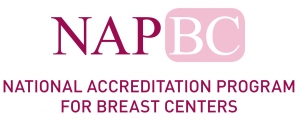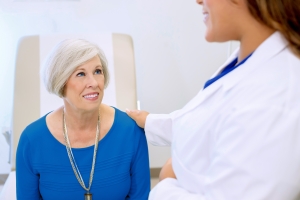 Phone: 863.603.6565
Phone: 863.603.6565  Location: North Campus /Hollis Cancer Center
Location: North Campus /Hollis Cancer Center
At Lakeland Regional Health, we provide patients with the most comprehensive services for all breast conditions in a patient-centered, compassionate environment. As Central Florida’s premier center for healing, hope and discovery, we work to restore your health as quickly as possible.
 Our Breast Surgeons are fellowship-trained experts, and our renowned cancer specialists and team members are dedicated to redefining and uplifting the standards of cancer care.
Our Breast Surgeons are fellowship-trained experts, and our renowned cancer specialists and team members are dedicated to redefining and uplifting the standards of cancer care.
Our state-of-the-art campus offers all the services necessary to conquer cancer. We use the most up-to-date technology and minimally invasive procedures, as well as advanced breast-conservation techniques and reconstructive surgery. Our breast cancer program is fully accredited by the National Accreditation Program for Breast Centers, overseen by the American College of Surgeons, and both of our surgeons are trained in Hidden Scar surgical procedures.
![]() To receive this accreditation, the Lakeland Regional Health Hollis Cancer Center complied with standards established by the NAPBC for treating women who are diagnosed with the full spectrum of breast disease. These standards include proficiency in leadership, clinical management, research, community outreach, professional education and quality improvement.
To receive this accreditation, the Lakeland Regional Health Hollis Cancer Center complied with standards established by the NAPBC for treating women who are diagnosed with the full spectrum of breast disease. These standards include proficiency in leadership, clinical management, research, community outreach, professional education and quality improvement.
This accreditation gives Lakeland Regional Health patients considering Hollis Cancer Center the confidence that they will have access to comprehensive, state-of-the-art care; a multidisciplinary care approach; information about ongoing clinical trials and new treatments; and quality breast care close to home.
Among the conditions we treat:
- Breast Cancer
- Personal and family history of breast cancer
- High-risk clinic
- Benign breast mass
- Nipple discharge
- Mastitis
- Breast pain
Scalp Cooling Treatments
Undergoing chemotherapy treatments is sometimes an integral part of the breast cancer journey. We understand that hair loss is feared by many chemotherapy patients. At Hollis Cancer Center, we want you to remain confident and in control. Our new Cold Caps have been shown to reduce hair loss in chemotherapy patients. Treatments take place simultaneously with chemotherapy infusions. Ask us about our scalp cooling system during your visit.
View the video below to learn about DeAnne Abell’s experience at Lakeland Regional Health’s Hollis Cancer Center Breast Program.
Meet our Team
Our physicians are experts in their field and are committed to provide compassionate and individualized care to each and every patient. Our surgeons are the only physicians in the region with Hidden ScarTM certification. Learn more about what peace of mind that gives breast cancer patients.

In addition, our supporting team is dedicated to ensure that all patients have the best possible experience during and after their visit. Together, Our Promise is YOUR HEALTH.®
At Hollis Cancer Center, we work as a multidisciplinary team. For the newly diagnosed patient and for more complicated patient cases, a team of cancer specialists meets each week to discuss the plan of care for each individual, exploring all options to assure that the patient receives the most appropriate level of attention and expertise.
Very often, you will see and visit with other care providers.
That may include Medical Oncologist Kamal Haider, MD; Medical Oncologist Sushma Simha Nakka, MD; Radiation Oncologist Kris M. Guerrier, MD; and Radiation Oncologist Michael Neil Shevach, MD.
Other team members you may interact with:
Radiologists: Physicians who review your mammogram, ultrasound, and/or MRI to detect any abnormalities and obtain tissue for diagnosis.
Pathologists: Physicians who specialize in studying your tissue from biopsy and surgery under the microscope as well as the individual markers that make your cancer unique. Our team works closely with our pathologists to formulate your individual treatment plan.
Social workers: Assist you and your family with issues pertaining to obtaining community resources, such as cancer support groups, patient financial assistance, and transportation.
Physical therapists: Licensed healthcare professionals who specialize in restoring your range of motion and function, which may be decreased or compromised as a result of the treatment received for breast cancer.
Nurse navigators: Specially trained nurses who help patients understand their treatment plans and cope with their diagnosis.
Breast Conditions We Treat
Breast cancer: All stages, from non-invasive breast cancer called DCIS to advanced or metastatic breast cancer.
High-risk patients: Includes someone with a family history of breast cancer, a personal history of breast cancer, a genetic mutation that causes an elevated risk of breast cancer, or other medical conditions that increase one’s breast cancer risks.
Benign breast conditions: Calcifications and lesions that appear in the breast, requiring a biopsy or surgical excision to rule out breast cancer or reduce the risk of developing breast cancer in the future.
Nipple discharge: Some discharge is physiologic, which means it is not worrisome for the development of breast cancer. Other types of discharge can signify that an underlying lesion or breast cancer can be causing the symptom.
Mastitis: Infections of the breast can be common, especially in smokers or during breastfeeding. The earlier this is evaluated, the easier and quicker it is to treat.
Gynecomastia: A benign overgrowth of breast tissue in males.
Frequently Asked Breast Cancer Questions
Questions range from what the different stages mean to what age mammograms should begin.
Questions in this blog post include lumpectomy vs. mastectomy, BRCA testing and self exams.
New state law dictates that your mammogram report must inform you if you have dense breasts. Find out why.
If you’re confused about all the conflicting reports about the value of breast self-exams, here’s what you need to know.
Breast Cancer Survivors Share Their Stories
http://www.mylrh.org/blog/at-age-37-she-conquered-fast-growing-breast-cancer/
You’ve Been Diagnosed with Breast Cancer. What’s Next?
If you have been diagnosed with breast cancer, you will consult with one of our breast surgeons as quickly as possible for a detailed review of your mammogram and/or ultrasound as well as a complete patient history and physical exam. A thorough review of your lab work will be discussed.
 At Lakeland Regional Health, we present each and every cancer case to our weekly multidisciplinary Tumor Board, where we discuss what stage the cancer is in as well as your specific lab results to determine the best individualized treatment.
At Lakeland Regional Health, we present each and every cancer case to our weekly multidisciplinary Tumor Board, where we discuss what stage the cancer is in as well as your specific lab results to determine the best individualized treatment.
Other diagnostic tests or treatment may be recommended prior to surgery. We understand that breast cancer can be emotionally devastating but with modern advances in medicine, breast cancer survival rates are extremely high and continue to increase.
Our breast program at Lakeland Regional Health offers the latest technology as well as the most up-to-date, evidence-based practices to ensure that you receive the best outcomes and safest care right here at home.
Cancer Support Group
Our Cancer Support Group meets each quarter at the Hollis Cancer Center to provide a safe and comfortable forum for patients, survivors and family members to learn and share.
Topics include:
- Diet and nutrition needs when faced with cancer. Session hosted by Lakeland Regional Health Nutrition team members and will include live demonstrations.
- Physical strength and maintaining your independence while conquering cancer. The session will be hosted by Lakeland Regional Health physical and occupation therapists.
- Understanding your diagnosis of cancer. The session will be hosted by Lakeland Regional Health oncologists and social workers.
- Life After Treatment: What to Expect. Session will be hosted by Lakeland Regional Health oncologists and social workers.
